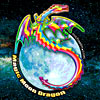
Kiwi is a fruit.
- botanical information
- origin
- nutritional information
- selection
- preparation
- magick correspondences and uses
botanical information:
Botanical name: Actinidia chinensis
Common name: Chinese gooseberry, kiwi fruit [NOTE: The fruit was named for the national bird of New Zealand, but an increasing number of New Zealanders find the name of the fruit insulting.]
Use the botanical name when ordering seeds (bulbs, etc.) or when looking up information in the library. Common names vary by nation, culture, and region, and sometimes the same common name is applied to different plants.
Varieties: There are ten varieties of kiwi fruit. The famous one is the large, egg-sized, sweet, green kiwi. The common gold kiwi is also sometimes available, and is smaller and sweeter than the green kiwi, with a bronze skin and a bright yellow fruit inside.
origin:
Origin: New Zealand.
nutritional information:
Kiwis are an excellent source of vitamin C.
nutritional value per kiwi (1 medium kiwi of 76 grams):
- Calories: 46 calories
- Proteins: 0.75 grams
- Carbohydrates: 11.3 gram
- Fat: 0.33 grams
- Fiber: 2.6 grams
- Vitamin C: 74.5 milligrams
- high in Vitamin C
selection:
Kiwi has the number eight (8) lowest pesticide load of 45 common fruits and vegetables studied in 2006 by the Environmental Working Group and is therefore a food that can be purchased conventionally-grown when organic isn“t available. The EWA explains, “While washing and rinsing fresh produce may reduce levels of some pesticides, it does not eliminate them. Peeling also reduces exposures, but valuable nutrients often go down the drain with the peel. The best option is to eat a varied diet, wash all produce, and choose organic when possible to reduce exposure to potentially harmful chemicals.”
According to USDA and FDA tests on commercially grown foods collected between 2000 and 2005, kiwi has a 15.3% (percentage) of samples tested with detectable pesticides, a 3.4% (percentage) of samples with two or more pesticides, an 0.2 average number of pesticides found in a sample, an average of 0.160 parts per million of all pesticides found, and 8 different pesticides found in use growing kiwi. These toxic pesticides don’t apply to organic foods.
preparation:
Chopped or diced kiwi makes an excellent addition to salads, sorbet, or salsa.
magickal correspondences and uses:
Western element: water
Magickal uses: innocent love, relaxation

kiwi fruit and berries
cautions and contraindications:
Cautions and contraindications: Kiwi fruit can trigger a food allergy that can lead to acute pancreatitis.













